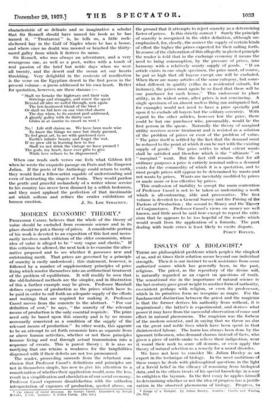MODERN ECONOMIC THEORY.*
PROFESSOR CASSEL believes that the whole of the theory of value should be excluded from economic science and in its place should be put a theory of prices. A considerable portion of his work is devoted to an exposition of this last and neces-
sarily involves much criticism of the older economists, whose idea of value is alleged to be " very vague and elastic." If this criticism be allowed, the next task is to examine the alter- native proposed and to see whether it possesses new and outstanding merit. That prices are governed by a principle of scarcity is easily understood ; this statement, however, is followed by a number of supplementary principles of price fixing which resolve themselves into an arithmetical treatment of the problem of equilibrium. It will readily be seen that the old-fashioned methods arc the simpler, and in illustration of this a further example may be given. Professor Marshall defines expenses of production as the prices which have to be paid in order to call forth an adequate supply of the efforts and waitings that are required for making it. Professor Cassel moves from the concrete to the abstract. " For our definition of cost," he says, " the scarcity of the relevant means of production is the only essential requisite. The price need only be based upon this scarcity and is by no means necessarily conceived as a condition of the supply of the
relevant means of production." In other words, this appears to be an attempt to set forth economic laws as separate from or above human activities, whether or not these principles
become living and real through actual transmission into a sequence of events. This is purest theory ; it is also so rarefying that one retains a weakness for the tangibilities dispensed with if their defects are not too pronounced.
The reader, proceeding onwards from the reluctant con- clusion that Professor Cassel's definitions and principles are not in themselves simple, has now to give his attention to a consideration of whether their application would, none the less, result in a simplification and elucidation of our social economy.
Professor Cassel expresses dissatisfaction with the orthodox interpretation of expenses of production, quoted above, on
• I'heTheory of Social Economy. By Gustav CAW'. Translated by Joseph McCabe. 3 vole. London: T. Fisher Unwin. [41s. net.]
the ground that it attempts to reject scarcity as a determining factor of prices. Is this strictly correct ? Surely the principle of scarcity is recognized in the older definition, although un- emphasized, for, clearly, the scarcer the supply of certain kinds of effort the higher the prices expected for their calling forth. In course of the elaboration of this allegedly neglected principle the reader is told that in the exchange economy it means the need to bring consumption, by the pressure of prices, into harmony with a relatively scanty supply of goods. " If an article exists in one single specimen, the price must, of course, be put so high that all buyers except one will be excluded. When there are many articles of the same category, but some- what different in quality (villas in a residential suburb, for instance), the prices must again be so fixed that there will be one purchaser for each house." This endeavour to place utility, in its widest sense, after prices is not convincing. A single specimen of an almost useless thing (an antiquated hat, for example) would not need to have a price specially put upon it to exclude all buyers but the solitary eccentric. With regard to the other articles, however low the price, there could be but one purchaser who, presumably, would be the first person in the queue. Naturally the theory of marginal utility receives severe treatment and is resisted as a solution of the problem of prices or even of the problem of value. " The price itself is settled by the fact that the demand must be reduced to the point at which it can be met with the existing supply of goods." The price settles to what extent wants shall be satisfied and therefore which is the " ultimate " or " marginal " want. But the fact still remains that for all ordinary purposes a price is entirely nominal unless a demand exists for the commodity of which it is a quotation, and to most people prices will appear to be determined by wants and not wants by prices. Wants are inevitably modified by prices or made more or less effective by prices.
This confession of inability to accept the main contention of Professor Cassel is not to be taken as underrating a work which is all-embracing, able and provocative. The first volume is devoted to a General Survey and the Pricing of the Factors of Production ; the second to Money and the Theory of Conjunctures. Professor Cassel's views on money are well known, and little need be said here except to repeat the criti- cism that he appears to be too hopeful of the results which would result from the application of a formula. The part dealing with trade crises is least likely to excite dispute.


































 Previous page
Previous page